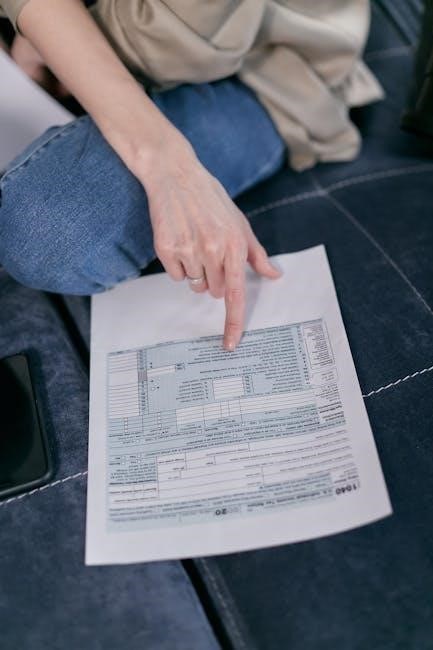
diesel 911 instructions
Diesel engines are renowned for their reliability and efficiency‚ making them a popular choice for heavy-duty applications․ Essential diesel engine repair manuals provide detailed guidance for troubleshooting‚ maintenance‚ and repair‚ ensuring optimal performance and longevity․ These resources are crucial for understanding the intricacies of diesel engine operation and addressing common issues effectively․
1․1 Basic Principles of Diesel Engines
Diesel engines operate on the principle of compression ignition‚ where air is compressed to high pressure and temperature‚ igniting fuel upon injection․ The four-stroke cycle includes intake‚ compression‚ power‚ and exhaust․ Key components like fuel injection systems and glow plugs ensure efficient combustion․ Diesel engines are known for their high torque and efficiency‚ making them ideal for heavy-duty applications and industrial use․
1․2 Importance of Proper Maintenance
Regular maintenance is critical to extend the lifespan of diesel engines․ Tasks like oil changes‚ filter replacements‚ and cooling system checks prevent premature wear and overheating․ Proper maintenance reduces fuel consumption and emissions‚ ensuring optimal performance․ Neglecting routine care can lead to costly repairs and downtime‚ emphasizing the need for a consistent and thorough maintenance schedule․

Diesel Engine Maintenance
Diesel engine maintenance involves routine checks‚ oil changes‚ and cooling system care․ Following detailed procedures ensures efficiency and prevents breakdowns‚ making it essential for longevity and performance․
2․1 Routine Checks and Inspections
Regular inspections are vital for diesel engine health․ Check oil levels‚ fuel system for leaks‚ and coolant condition․ Inspect belts‚ hoses‚ and exhaust systems for damage or wear․ Ensure air and fuel filters are clean or replaced as needed․ Routine checks help prevent major issues and ensure smooth operation․ Always refer to the manual for specific intervals and procedures․
2․2 Oil and Filter Changes
Regular oil and filter changes are essential for diesel engine longevity․ Always warm up the engine before draining oil to ensure proper flow․ Use a drain pan and replace the oil filter with a new one․ Refill with the recommended oil type and capacity specified in the manual․ Clean or replace fuel filters as needed to maintain fuel system efficiency․
2․3 Cooling System Maintenance
Proper cooling system maintenance is vital for preventing diesel engine overheating․ Regularly inspect the coolant level and top it off as needed․ Replace the coolant every 2-3 years or as specified in the manual․ Check for leaks in hoses and radiator․ Ensure the water pump and thermostat function correctly․ Flush the system periodically to remove debris and corrosion‚ maintaining optimal engine temperature․

Troubleshooting Common Issues
Diesel engines often face issues like overheating or low power․ Troubleshooting involves identifying symptoms‚ using diagnostic tools‚ and applying repair techniques․ Regular checks and maintenance help prevent these problems․
3․1 Identifying Common Problems
Common diesel engine issues include overheating‚ low power output‚ and faulty glow plugs․ These problems often arise from neglected maintenance‚ such as dirty fuel systems or worn components․ Regular inspections and diagnostic tools help identify these issues early‚ preventing costly repairs․ Addressing these problems promptly ensures optimal engine performance and longevity․
3․2 Diagnostic Tools and Techniques
Advanced diagnostic tools‚ like digital multimeters and scan tools‚ are essential for troubleshooting diesel engines․ These tools help measure parameters such as compression‚ fuel pressure‚ and glow plug resistance․ Techniques include visual inspections‚ fluid analysis‚ and system tests‚ enabling precise identification of faults․ Combining these tools and methods ensures accurate diagnoses‚ leading to efficient and effective repairs․

Repair Procedures
Repair procedures involve a systematic approach‚ utilizing essential tools and step-by-step guides to address engine issues effectively․ Proper testing post-repair ensures functionality and prevents future complications․
4․1 Basic Repair Tools and Equipment
Essential tools for diesel engine repair include wrenches‚ pliers‚ screwdrivers‚ and multimeters․ A compression tester and glow plug tester are crucial for diagnosing issues like low compression or faulty glow plugs․ Additional equipment such as drain pans‚ pressure washers‚ and torque wrenches are necessary for routine maintenance and repairs․ Always refer to the repair manual for specific tool requirements and safety guidelines․
4․2 Step-by-Step Repair Instructions
Always start by consulting the repair manual for specific instructions․ Begin with diagnosing the issue using tools like a multimeter or compression tester․ Once identified‚ follow the manual’s step-by-step guide for disassembly‚ inspection‚ and replacement of faulty components․ Reassemble carefully‚ ensuring all torque specifications are met․ Finally‚ test the engine under load to confirm the repair was successful and no new issues arise․
Fuel System Maintenance
Regularly clean and inspect the fuel system to prevent contamination․ Replace fuel filters as recommended to ensure proper fuel flow and engine performance․ Always use high-quality diesel fuel to maintain efficiency and avoid premature wear on components․
5․1 Cleaning the Fuel System
Cleaning the fuel system is crucial for maintaining diesel engine performance․ Use specialized fuel system cleaners to remove dirt‚ debris‚ and contaminants․ Start by disconnecting the fuel lines and draining the tank․ Apply the cleaning solution and let it circulate through the system․ Flush thoroughly with fresh diesel fuel to ensure all components are free from residue․ Regular cleaning prevents fuel flow issues and enhances engine efficiency․
5;2 Replacing Fuel Filters
Replacing fuel filters is essential for optimal diesel engine performance․ Turn off the engine and let it cool․ Locate the fuel filter‚ relieve system pressure‚ and remove the old filter․ Install the new filter by hand tightening it securely․ Dispose of the used filter properly and check for any leaks before restarting the engine․ Regular replacements prevent contamination and ensure smooth fuel flow․
Cooling System Repair
Cooling system repair involves checking and replacing coolant‚ inspecting hoses for leaks‚ and flushing the system to ensure proper engine temperature regulation and prevent overheating issues․
6․1 Checking and Replacing Coolant
To ensure proper cooling system function‚ regularly inspect the coolant level and condition․ Drain and flush the system if contaminated or degraded․ Replace with a 50/50 glycol-to-water mixture to prevent freezing and corrosion․ Always check for leaks in the radiator‚ hoses‚ and water pump before refilling․ Proper coolant maintenance is critical to avoid engine overheating and potential damage to internal components․
6․2 Repairing Leaks and Damaged Components
Identify leaks in hoses‚ radiators‚ or water pumps by inspecting for cracks or corrosion․ Replace damaged hoses with genuine parts and tighten connections securely․ For radiator leaks‚ apply a sealant or replace the radiator if damage is extensive․ Inspect the water pump for wear and replace it if necessary․ Ensure all components are properly tightened and tested to prevent future issues and maintain optimal cooling system performance․
Exhaust System Maintenance
Regular cleaning of the exhaust system prevents soot buildup․ Inspect for cracks or damage and replace components promptly to maintain engine efficiency and performance․
7․1 Cleaning the Exhaust System
Cleaning the exhaust system involves inspecting for cracks or damage and removing soot buildup․ Use wire brushes or chemical cleaners to clear blockages․ Regular maintenance ensures proper gas flow‚ reducing emissions and improving engine efficiency․ Neglecting this can lead to decreased performance and potential damage to other components; Always follow safety guidelines when working with exhaust systems․
7․2 Replacing Damaged Exhaust Components
Replacing damaged exhaust components involves identifying faulty parts like mufflers or pipes․ Use specialized tools to remove rusted or corroded sections․ Follow step-by-step repair manuals for precise instructions․ Ensure all connections are secure to prevent leaks․ Regular inspections can help catch issues early‚ avoiding costly repairs․ Always prioritize safety when working with exhaust systems to prevent injuries and ensure proper function․

Glow Plug Maintenance
Regularly test glow plugs using an ohmmeter‚ replacing those with resistance exceeding 2 ohms․ Ensure all glow plugs are securely reconnected after replacement to maintain proper engine function․
8․1 Testing Glow Plugs
Use an ohmmeter to test glow plugs by connecting the positive lead to the glow plug terminal and the negative lead to the engine block․ If resistance exceeds 2 ohms‚ the glow plug should be replaced․ Proper grounding is essential for accurate readings․ Regular testing ensures reliable engine starting and performance‚ especially in cold conditions․ Always follow safety guidelines when working with electrical components․
8․2 Replacing Faulty Glow Plugs
Disconnect the negative battery cable to ensure safety․ Remove the air cleaner assembly and locate the glow plugs․ Use a deep socket or wrench to remove the faulty plug․ Install the new glow plug‚ ensuring it is securely tightened with a torque wrench․ Reconnect all components and test the engine to confirm proper starting and operation․ Always follow manufacturer guidelines for replacement․

Preventive Maintenance
Regular checks‚ inspections‚ and scheduled services are vital for maintaining diesel engine health․ Follow daily checklists and adhere to recommended maintenance intervals to prevent unexpected breakdowns and ensure optimal performance․
9․1 Daily Maintenance Checklist
A daily maintenance checklist ensures diesel engines run smoothly․ Check oil levels‚ coolant levels‚ and inspect air and fuel filters for cleanliness․ Verify glow plug functionality and belt tensions․ Examine hoses for leaks or damage․ Monitor exhaust systems for blockages and ensure proper fuel flow․ Addressing these tasks daily helps prevent breakdowns and maintains engine efficiency․
9․2 Scheduled Maintenance Intervals
Scheduled maintenance is vital for diesel engines․ Replace engine oil and filters every 5‚000 to 7‚500 miles․ Fuel filters should be changed every 10‚000 to 15‚000 miles․ Inspect coolant systems annually or every 50‚000 miles․ Check belts and hoses every 50‚000 miles․ Follow manufacturer guidelines to ensure optimal engine performance and prevent unexpected repairs‚ extending the engine’s lifespan and reliability․
Technical Specifications
Diesel engines require specific oil grades like SAE 5W-20 for optimal performance․ Service intervals and torque specifications vary by manufacturer‚ ensuring proper engine operation and longevity․
10․1 Engine Oil Requirements
Diesel engines require specific oil grades‚ such as SAE 5W-20‚ for optimal performance․ Synthetic oils are recommended for extreme temperatures and heavy-duty use․ Always follow manufacturer guidelines to ensure compatibility and prevent engine damage․ Proper viscosity maintains lubrication and fuel efficiency‚ while incorrect oil can lead to premature wear or engine failure․
10․2 Fuel Recommendations
Use ultra-low sulfur diesel fuel to minimize emissions and prevent engine damage․ Avoid gasoline or other fuels‚ as they can cause severe engine harm․ Always store fuel in clean‚ dry containers and check for contamination before use․ Proper fuel management ensures optimal performance and longevity of your diesel engine‚ adhering to manufacturer guidelines for best results․

Common Diesel Engine Problems
Diesel engines often face issues like overheating‚ low power output‚ and fuel system contamination․ Regular maintenance and proper diagnostics can help identify and resolve these problems effectively․
11․1 Engine Overheating
Engine overheating is a common issue in diesel engines‚ often caused by coolant leaks‚ faulty thermostats‚ or blocked radiators․ Symptoms include a rising temperature gauge‚ reduced performance‚ and potential engine damage․ Immediate action is required to prevent severe damage․ Refer to detailed repair manuals for step-by-step troubleshooting and solutions to address overheating effectively․
11․2 Low Power Output
Low power output in diesel engines can result from issues like faulty fuel injectors‚ clogged air filters‚ or turbocharger problems․ Regular maintenance‚ such as cleaning or replacing fuel filters and ensuring proper airflow‚ is essential․ Consulting detailed repair manuals helps diagnose and address these issues effectively to restore engine performance and efficiency․

Advanced Repair Techniques
Advanced repair techniques involve rebuilding engines‚ upgrading performance‚ and using specialized tools․ Detailed manuals guide complex procedures‚ ensuring precision and efficiency in high-level diesel engine repairs․
12․1 Rebuilding the Engine
Rebuilding a diesel engine involves disassembling‚ inspecting‚ and replacing worn components․ Step-by-step manuals provide detailed instructions‚ including torque specifications‚ for a successful rebuild․ Proper tools and clean conditions ensure precision and safety‚ while expert tips help avoid common mistakes during the process․ This comprehensive approach restores the engine to optimal functioning․
12․2 Upgrading Engine Performance
Upgrading diesel engine performance involves enhancing power and efficiency through modifications․ Popular upgrades include turbocharger improvements‚ high-flow fuel injectors‚ and performance engine swaps․ Detailed manuals guide technicians through cylinder head modifications and engine management system tweaks․ These upgrades boost torque‚ horsepower‚ and overall engine responsiveness‚ making them ideal for heavy-duty applications and performance enthusiasts seeking improved capabilities․

Safety Precautions
Always handle diesel fuel with care‚ avoiding skin contact and inhalation․ Use tools and equipment properly to prevent accidents․ Strictly follow repair manual safety guidelines․
13․1 Working with Diesel Fuel
When handling diesel fuel‚ always wear protective gloves and eyewear․ Ensure good ventilation to avoid inhaling fumes․ Store fuel in approved containers and keep it away from heat sources․ Never smoke near diesel fuel․ In case of spills‚ clean them immediately to prevent accidents․ Properly dispose of used fuel and rags to maintain safety and environmental standards․
13․2 Proper Use of Tools and Equipment
Always use tools and equipment specifically designed for diesel engines to ensure safety and effectiveness․ Follow the manufacturer’s instructions for each tool․ Regularly inspect tools for wear and tear․ Properly store equipment to maintain its condition․ Training on specialized tools is essential to avoid damage to the engine or personal injury․ Adhere to recommended torque specifications for bolts and fasteners․

Tools and Equipment
Essential tools include wrenches‚ screwdrivers‚ and multimeters for routine checks․ Specialized tools like torque wrenches and compression testers are vital for precise diagnostics and repairs․
14․1 Essential Tools for Diesel Engine Repair
The essential tools for diesel engine repair include wrenches‚ screwdrivers‚ pliers‚ and multimeters․ A torque wrench is crucial for precise bolt tightening‚ while a compression tester helps diagnose engine issues․ Specialized tools like fuel injectors and glow plug testers are also vital․ These tools ensure accurate diagnostics and efficient repairs‚ making them indispensable for any diesel engine maintenance task․
14․2 Specialized Tools for Advanced Repairs
Advanced diesel engine repairs require specialized tools such as engine stands‚ hydraulic presses‚ and bore gauges․ Tools like turbocharger rebuild kits and injector testers are essential for complex tasks․ These tools enable precise disassembly‚ inspection‚ and reassembly of critical components‚ ensuring high-quality repairs and minimizing downtime for heavy-duty diesel engines․ They are indispensable for professional mechanics handling intricate engine overhauls․
Proper maintenance and repair of diesel engines ensure optimal performance and longevity․ Following detailed guides and troubleshooting steps helps maximize efficiency and minimize downtime effectively․
15․1 Summary of Key Points
Proper maintenance and repair of diesel engines are essential for ensuring efficiency and longevity․ Regular checks‚ oil changes‚ and coolant maintenance prevent common issues like overheating․ Addressing low power output and fuel system problems early avoids major repairs․ Always follow detailed manuals and use diagnostic tools to identify and fix issues promptly‚ ensuring optimal performance and reliability over time;
15․2 Final Tips for Diesel Engine Care
Regular maintenance is crucial for diesel engine longevity․ Always use recommended oil and filters‚ and follow a strict service schedule․ Inspect fuel systems and replace filters to prevent contamination․ Monitor coolant levels and address leaks promptly․ Keep glow plugs in good condition and ensure proper battery connections․ Refer to repair manuals for specific guidance and use diagnostic tools to identify issues early․ Proper care ensures reliable performance and avoids costly repairs․